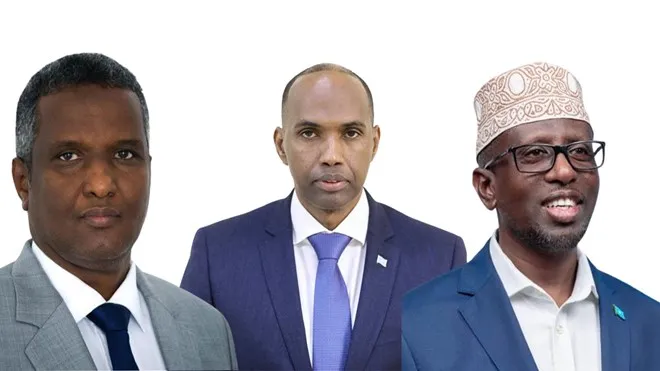Former Somali leaders Sheikh Sharif Ahmed, Hassan Ali Khaire, and Abdirahman Abdishakur have sharply criticized the recent collapse of reconciliation talks in Mogadishu, accusing President Hassan Sheikh Mohamud of attempting an unconstitutional extension of his term. In a joint statement, they condemned what they described as a politically motivated maneuver disguised as a reconciliation effort. The trio vowed to utilize all legal channels available to block any such extension, recalling the controversy faced by the previous administration over similar attempts, which they assert were rightly rejected. Their statement underscores a growing divide in Somali politics as leaders debate the future of the nation’s governance structure.
The former leaders further accused President Mohamud of misleading the public with promises of implementing a “one person, one vote” electoral system. They argue that this promise is merely a tactic to divert attention from his true intention of clinging to power. These allegations come at a critical juncture, as Somalia’s political environment is already fraught with tensions surrounding governance, security, and the ongoing battle against the insurgent group Al-Shabaab, which has recently rebranded as Khawarij. The former leaders emphasize the need for genuine reforms and democratic processes, cautioning against political tactics that undermine public trust and stability.
Amid these criticisms, reports indicate that Al-Shabaab’s activities persist, casting doubts on government claims of success in its counterterrorism efforts. Critics warn that diverting focus to internal political maneuvering instead of addressing the pressing threats of terrorism and governance could jeopardize national stability. They argue that Somalia’s leaders should prioritize security, governance reforms, and the broader stabilization of the nation, rather than engaging in political strategies perceived as self-serving. The former leaders highlight the urgency of confronting Somalia’s challenges in a unified and transparent manner.
The international community has expressed concern over the growing political discord, with observers suggesting that such internal disputes could further destabilize Somalia as African Union forces prepare to withdraw by December. The planned exit of these forces leaves Somalia’s security landscape in a precarious state, raising fears of heightened insecurity. This political impasse not only challenges the credibility of President Hassan Sheikh Mohamud’s leadership but also underscores the deep-seated governance issues that Somalia faces. The delicate balance between power retention and the advancement of national interests remains a critical point of contention, testing the country’s democratic foundations and resilience.


Leave a Reply